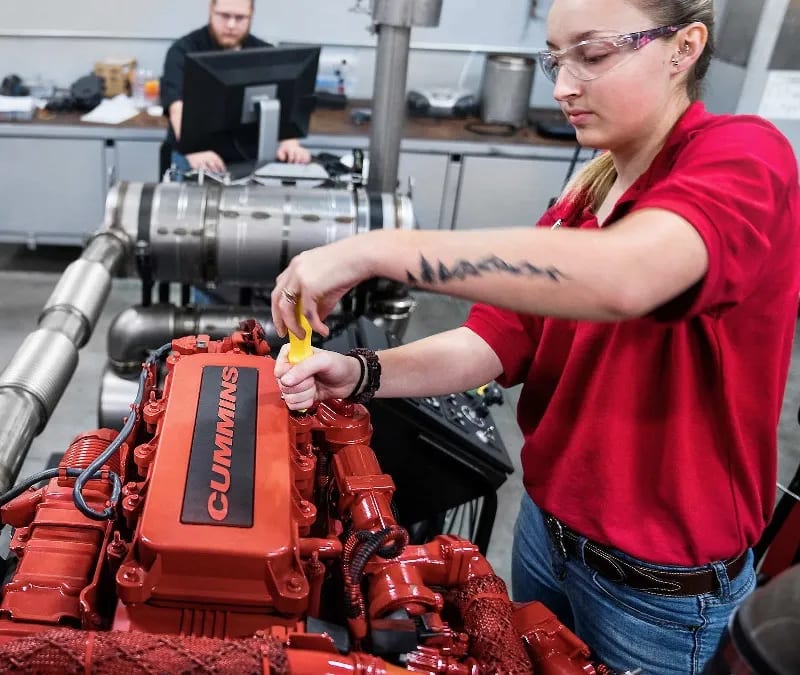How To Become a Diesel Mechanic: Qualifications & Requirements
Interested in training to become a diesel mechanic? Learn about diesel mechanic qualifications and requirements here and how UTI can help!
Not all diesel mechanics work in a garage or at a single location. Mobile diesel mechanics go where the jobs are. They fix diesel trucks and diesel equipment at locations like the side of the road, on farms and at various businesses where trucks and equipment need repairs. They also travel to clients to perform routine maintenance.
Work as a diesel mobile mechanic is interesting because you’re constantly dealing with new customers, new vehicles and new challenges. If you enjoy being on the move and want your work environment to change every day, working as a mobile diesel mechanic may be for you.
Key Points
Diesel mechanics work on engines and machinery that power large vehicles and equipment, like transportation trucks, buses, cranes and bulldozers. Mobile diesel mechanics, also known as mobile diesel technicians or mobile truck mechanics, go directly to the customer. Instead of servicing vehicles and equipment in a single repair shop, on-the-go diesel mechanics drive out to the client and bring their repair equipment.
A day in the life of a mobile diesel tech might look like:
Mobile diesel mechanics may not always work the typical 9-to-5 job schedule.
If you crave flexibility, you might be interested in a mobile diesel technician job because it could involve working nights and/or weekends, if that’s what you’re looking for.
Some mobile diesel mechanics form their own mobile diesel mechanic businesses, which allows them to control their workload and schedule.
All mobile diesel mechanics need to have excellent communication skills, since they’re dealing directly with clients. They also need to be physically fit because they’re working with tools and heavy equipment.
Mobile diesel mechanics have the same knowledge that a diesel mechanic working in a shop would. For those who want to be hired as a mobile diesel mechanic, the U.S. Bureau of Labor Statistics (BLS) reports employers prefer to hire applicants who have completed postsecondary diesel engine repair training. Trade school graduates already have the knowledge to start an entry-level job as a diesel mechanic and can require less immediate on-the-job training to get started.

Some mobile diesel mechanic jobs will require that an applicant has worked in a shop for several years. Sometimes, having formal diesel mechanic training is enough to get an entry-level job as a mobile diesel mechanic.
In some cases, mobile diesel mechanic employers will require that a technician is certified by the National Institute for Automotive Service Excellence (ASE) or is working toward certification since it requires two years of experience. ASE certification is the standard for professional diesel mechanics. An advantage of studying the Diesel Technology program at Universal Technical Institute (UTI) is that the program counts toward one year of experience required to test for ASE certification.
Whether you work for yourself or someone else, you’ll need to have your own set of tools to complete diesel mechanic work. This diesel mechanic tools list was created based on what some of the most well-known diesel brands require.
Mobile diesel mechanics who apply for employment also need to have good driving records and a valid driver’s license. Because a mobile diesel mechanic job requires a lot of driving to get to clients, employers want to hire safe, legal drivers.
If your record has moving violations on it, you may still be able to get a mobile diesel mechanic job. It’s always important to be honest during the application process.
To create a mobile diesel repair business, you’ll want to create a business plan and form a legal structure for your business. The U.S. Small Business Administration (SBA) has information on how to register your business. You’ll also want to take care of:
The SBA provides local small business resources to help you get started.
The BLS reports that the median annual salary for bus and truck mechanics and diesel engine specialists in the United States was $58,970 in May 2023.29 This means half of diesel technicians earned more and half earned less. Keep in mind that salary can vary based on several factors, including experience, employer, demand and cost of living in the area.
Traveling diesel mechanics are beneficial because they offer convenience and flexibility. They travel to homes or workplaces to help customers with busy schedules or competing priorities. They also often offer night or weekend service.
Yes, this is one of the benefits of traveling mechanics! They can meet customers roadside to help them get their vehicle back on the road as quickly and safely as possible.
Mobile diesel mechanics travel with tools and parts that help them diagnose and repair various mechanical parts and technical systems, such as engines, brakes, transmissions or electrical and cooling systems. They also perform maintenance tasks like oil changes, lubricating equipment and checking tire pressure.
A mobile heavy diesel mechanic specializes in large machinery. They might travel to truck stops, roadside sites, construction sites, mines or farms to service equipment such as transportation trucks, buses, locomotives, cranes or bulldozers.
If working with big trucks and diesel equipment in a mobile position sounds appealing to you, you can complete your diesel technician training at UTI in less than a year.7
UTI’s Diesel Technology program is 45 weeks long and can help prepare students for careers as entry-level diesel technicians. Get hands-on training in a supportive environment so you’re prepared to begin a career as a mobile diesel mechanic.18
For information on the program, call 1-800-834-7308 or request info online.
Universal Technical Institute of Illinois, Inc. is approved by the Division of Private Business and Vocational Schools of the Illinois Board of Higher Education.